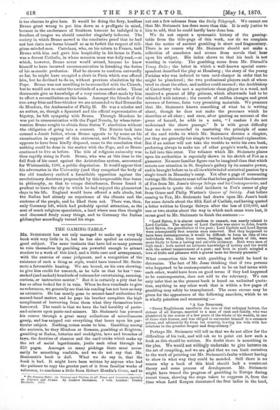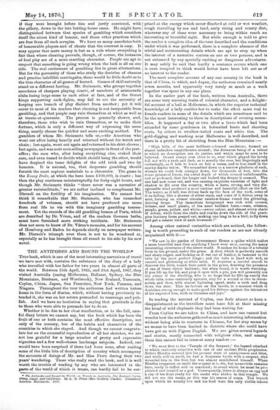THE GAMING-TABLE.'
lart. SvErstuirrz has not only managed to make up a very big book with very little in it, but he has also spoiled an extremely good subject. The same instincts that have led so many persons to ruin themselves by gambling are powerful enough to attract readers to a work of this kind, and a little care and arrangement, with the exercise of some judgment, and a recognition of the existence of such a thing as style, would have insured Mr. Stein- metz a favourable hearing. We are bound, on his own showing, to give him credit for research, as he tells us that he has "ran- sacked (and sacked) hundreds of volumes for entertaining, amusing, 'curious, or instructive matter." But it is certainly a pity that he has so often looked for it in vain. When he does vouchsafe to give is references, we generally see that his reading has not been as deep as extensive. He has mostly gone to second-hand authorities for aecond-hand matter, and he pays his brother compilers the high compliment of borrowing from them what they themselves have borrowed. The result is that we have the bad heraldry of paste- and-scissors upon paste-and-scissors. Mr. Steinmetz has pursued his course through a great many collections of miscellaneous gossip, and has snipped out everything that bears upon his par- ticular subject. Nothing comes amiss to him. Gambling among the ancients, be they Ilindoos or Romans, gambling at Brighton, gambling at Baden, lotteries and cockfights, laws and breaches of laws, the doctrine of chances and the card-tricks which make up the art of social legerdemain, jostle each other through his S50 pages. Amongst so many pickings there must neces- sarily be something readable, and we do not say that Mr. Steinmetz's book is dull. What we do say is, that the book is bad. It might have been written by anyone who had the patience to copy the greater part of it from familiar works of reference, to condense a little from Robert Iloudin's Grecs, and to The Gaming-Table; its is England and Franca Brothers. cut out a few columns from the Daily Telegraph. We cannot see that Mr. Steinmetz has done more than this. It is only justice to him to add, that he could hardly have done less.
We do not expect a systematic history of the gaming- table from the title-page of this work, nor do we complain that the notice of ancient gambling is short and fragmentary. There is no reason why Mr. Steinmetz should not make a collection of anecdotes and scenes from novels that bear upon his subject. His index shows us that his book is not wanting in variety. The gambling scene from Mr. Disraeli's
Young Duke ; the letter in which a well-known special corre- spondent described the play at Homburg ; the story of the young
Parisian who was induced to turn card-sharper in order that he might be plundered ; the two professional players each of whom tried to cheat the other, and neither could succeed; the Archbishop of Canterbury who met a mysterious chess-player in a wood, and
received a present of fifty guineas, which afterwards had to be refunded with interest ; the records of sudden changes and great reverses of fortune, form very promising materials. We presume that Mr. Steinmetz knows something of what he is writing about, though he does not make the processes which he describes at all clear ; and once, after quoting an account of the game of hazard, he adds in a note, "I confess I do not
understand the above pamsge." It is with great difficulty that we have succeeded in mastering the principle of some of the card tricks to which Mr. Steinmetz devotes a chapter, yet they are generally too simple to need a lengthened explanation.
But if an author will not take the trouble to write his own book, preferring always to make use of other people's words, he is sure to fall into this error. The reliance which Mr. Steinmetz places upon his authorities is especially shown in his sketch of Fox as a gamester. No more familiar figure can be imagined than that which arrests our attention in St. Stephen's gallery by its massive power, and is brought before us in all its whirlwind of oratorical passion bya single touch in Macaulay's essay. Yet after a page of unmeaning verbiage Mr. Steinmetz must tell us that he has gathered the character
of Fox from Mr. Jesse's George Selwyn and his Contemporaries, and he proceeds to quote the chief incidents in Fox's career of play from Grace and Philip Warton's Queens of Society. Just before coming-to Fox, Mr. Steinmetz had drawn upon Mr. Jesse's book for some details about the fifth Earl of Carlisle, and having quoted a letter written to George Selwyn after the' loss of £10,000, and one or two stories about the way in which such sums were lost, it
seems good to Mr. Steinmetz to finish the sentence :-
"Lord Byron, it is almost needless to remark, was nearly related to Lord Carlisle. The mother of Lord Carlisle was sister to John, fourth Lord Byron, the grandfather of the poet ; Lord Carlisle and Lord Byron were consequently first cousins once removed. Had they happened to have been Contemporaries, it would be difficult to form an idea of two individuals who, alike from tastes, feelings, and habits of life, were more likely to form a lasting and suitable intimacy. Both were men of high rank ; both united an intimate knowledge of society and the world with the ardent temperament of a poet ; and both in youth mingled a love of frolic and pleasure with a graver taste for literary pursuits."
What connection this has with gambling it would be hard to determine. The fact of Mr. Jesse thinking that if two persons who happened to be contemporaries and to be on bad terms with each other, would have been on good terms if they had happened to be contemporaries, does not add to the relevancy. We can only infer that as the present book is based on unlimited quota- tion, anything in any other work that is within a few pages of gambling may safely be transplanted. The same excuse may be given for the appearance of the following anecdote, which to us is wholly pointless and unmeaning :—
"A SAD Rinincimia.
"Every Englishman recollects the fate of that unhappy heiress, the richest of all Europe, married to a man of rank and family, who was plundered in the coarse of a few years of the whole of his wealth, in one of those club houses, and was obliged to surrender himself to a common prison, and ultimately fly from his country, leaving his wife with her relations in the greatest despair and despondency."
Perhaps Mr. Steinmetz will tell us that we do not allow for the difficult* of his task, and will ask us to point out how such a book as this should be written. No doubt there is something in the plea. We would not willingly undertake to give lectures on the art of compiling, and we are glad that we can limit ourselves to the work of pointing out Mr. Steinmetz's faults without having to show in what way they could be mended. Still there is no reason why a book of this kind should lack a 'consistent theory and some process of development. Mr. Steinmetz might have traced the progress of gambling in Europe during Votaries and rictinu. in an Times and Countries, especially recent times, showing the steps taken to suppress it, from the By Andrew Steinmetz. 2 vols. London: Tinsley 1
time when Lord Kenyon threatened the first ladies in the land,
if they were brought before him and justly convicted, with the pillory, down to the late betting-house cases. He might have distinguished between that species of gambling which considers itself the nicest kind of honour, and those other practices which are free from all such scruples. We have so many anecdotes both of honourable players and of cheats that the contrast is easy. It may appear that more money is lost as a rule where everything is fair than where cheating prevails, though, of course, the instances of foul play are of a more startling character. People are apt to auspect that something is going wrong when the luck is all on one aide. The real excitement of gambling lies in great alternations. But for the perversity of those who study the doctrine of chances and practise infallible martingales, there would be little doubt as to the true character of all games of hazard. Games of skill naturally stand on a different footing. Mr. Steinmetz, who groups together anecdotes of sharpers playing dcarte, of members of aristocratic clubs losing large sums to each other at faro, and of the Stuart kings supporting cock-fights, may fail to see the necessity of keeping one branch of play distinct from another ; yet it will occur to most of his readers that cheating is not inseparable from gambling, and that people may ruin themselves at whist as well as at trente-et-quarante. The process is generally slower, and, therefore, those who wish to ruin themselves, or to make their fortune, which is only a different way of expressing the same thing, mostly choose the quicker and more exciting method. The gamblers of whom Mr. Steinmetz tells us,—the American who• went out after losing heavily and returned without his watch and ohain ; lost again, went out again and returned in his shirt. sleeves ; lost again, and was next seen selling newspapers in front of the post- office; the men who, after losing everything else, staked their -ears, and even tossed to decide which should hang the other, would have despised the tame delights of the odd trick and two by honours. It is natural, too, that desperate gambling should furnish the most copious materials to a chronicler. The game in the Young Duke, at which the hero loses £100,000, is ecarte ; but then the play continues uninterruptedly for forty-eight hours, and though Mr. Steinmetz thinks "there never was a narrative of greater verisimilitude," we are rather inclined to compliment Mr. Disraeli on the fertility of his imagination. We cannot but think it remarkable that Mr. Steinmetz, who has ransacked hundreds of volumes, should not have produced one scene from real life to vie with this imaginary gambling tourna- ment. Yet the records of the old gambling houses of Paris, which are described by Dr. Veron, and of the modern German baths, must have furnished more striking incidents. Mr. Steinmetz does not seem to know of Dr. Veron'a memoirs, and for his account of Homburg and Baden he depends chiefly on newspaper writers. Mr. Disraeli's triumph over them is not to be wondered at, -especially as he has brought them all round to his side by his new cove'.































 Previous page
Previous page